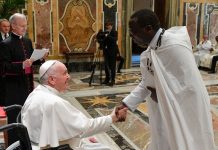You are not signed in as a Premium user; we rely on Premium users to support our news reporting.
Sign in or Sign up today!
VATICAN CITY (ChurchMilitant.com) – Pope Francis rehashed his theologically erroneous view of “fraternity” in his Christmas address — asserting the incarnation makes all human beings “truly” brothers and sisters, even if they belong to another religion.

Contradicting the Christmas Day lectionary reading from the prologue of St. John’s Gospel, which categorically states that in the incarnation God adopts as his children only those “who received him [Jesus], who believed in his name” (John 1:12), Francis’ Urbi et Orbi insisted “we are all brothers and sisters” despite religious differences.
The pontiff stressed that “the ecological crisis and grave economic and social imbalances only worsened by the coronavirus pandemic,” made it “all the more important for us to acknowledge one another as brothers and sisters.”
“The same thing is true of relationships between peoples and nations: brothers and sisters all!” Francis added, citing his encyclical Fratelli Tutti — praised by Spanish and Italian Freemasons for its interpretation of “fraternity” as harmonious with Masonic doctrine.
Pretext for Pushing Vaccines?
Comparing Christ’s light, which “comes for everyone, not just for some,” with “various lights of hope … such as the discovery of vaccines,” the pope attacked so-called vaccine nationalism.
“For these lights [vaccines] to illuminate and bring hope to all, they need to be available to all,” Francis insisted, recapitulating his censure of capitalism.
“I cannot place myself ahead of others, letting the law of the marketplace and patents take precedence over the law of love and the health of humanity,” he declared, asking “government leaders, businesses, international organizations” to provide “vaccines for all, especially for the most vulnerable and needy of all regions of the planet.”
Confusion, Contradiction, Omission
“The Urbi et Orbi message leaves me with a bittersweet taste on the palate,” José António Ureta, co-author of Pope Francis’ Paradigm Shift: Continuity or Rupture in the Church’s Mission? told Church Militant.
Ureta explained how Francis was contradicting himself in his Urbi et Orbi message:
On the theoretical level, Francis’ Christmas message rightly affirms that true brotherhood is that which God offers humanity by giving His Son, Jesus. This part of the message almost corrects the scandalously naturalistic and interreligious character of Fratelli Tutti, which delighted the Masonic lodges of Italy and Spain.
But, on a practical level, the Argentine pontiff reaffirms his utopian vision of a human family in which religious divergences and conflicts between nations are resolved through the renunciation of national interests. The same utopianism appears in his call not to erect walls to the challenge of the COVID-19 epidemic, which knows no borders, when it was precisely by re-establishing borders that some countries achieved better results in combating it.
Jesus himself did not describe everyone as his brothers and sisters but only those who were one with Him in their assent to the will of the Father.
The pope’s traditional message to the “city [Rome] and world” drew attention to matters of concern in Syria, Iraq, Yemen, Libya, Lebanon, Ukraine, Burkina Faso, Mali, Niger, Ethiopia, Mozambique, South Sudan, Nigeria, Cameroon, Chile, Venezuela, Philippines and Vietnam.
Francis mentioned the Israelis and Palestinians as well as named the persecuted Rohingya and Yazidi peoples, but did not mention China or persecuted Christians.
Ureta told Church Militant he “found shocking the deafening silence of the pope on the persecution of pro-democracy campaigners in Hong Kong and the Uighur Muslims.”
“The pope does not mention them in the long list of conflicts and tragedies, obviously to avoid jeopardizing the agreement between the Vatican and the Chinese Communist Party,” Ureta commented.
Calling all humans our brothers and sisters denigrates the idea that those who are baptized and have faith in Christ are ‘adoptive sons’ and ‘joint heirs with Christ.’
Ureta continued:
Worst of all was Pope Francis’ omission to defend the unborn of his own country, the fate of whom is hanging on a couple of votes in the Senate, during a session to be held the day after the Feast of the Holy Innocents. If the modern Herods succeed in passing the bill in Argentina, the victims may ask him the question God asked Cain: “Where is your brother, Abel?”
Pope Francis’ statements on “fraternity” have sparked controversy on the Church’s teaching on brotherhood.

‘Brotherhood’ Clarified
“Jesus himself did not describe everyone as his brothers and sisters but only those who were one with Him in their assent to the will of the Father,” Pope Benedict XVI, then Cdl. Joseph Ratzinger, wrote in his book on Christian brotherhood, Die Christliche Brüderlichkeit.
“Jesus has predicted to his disciples the collapse and failure of all earthly brotherhood and family love,” Ratzinger observed, noting that “the original brotherhood of all men — was the aim of the French Revolution.”
“Brotherhood, extended so far, becomes unrealistic and meaningless,” he warned. “In fact, a brotherliness which embraces everyone equally cannot expect to be taken seriously anymore.”
Responding to a 2017 statement by the United States Conference of Catholic Bishops addressing Muslims as “brothers and sisters,” theologian and writer Fr. Dwight Longenecker asked: “Not wishing to pick too many nits, but in what sense exactly are Muslims our ‘brothers and sisters?'”
“I always thought that in the Christian faith our brothers and sisters were those who shared with us baptism and faith in Jesus Christ as the incarnate Son of God and our Eternal Redeemer,” Longenecker replied.
The Urbi et Orbi message leaves me with a bittersweet taste on the palate.
He continued, “Perhaps the bishops mean that Muslims are our ‘brothers and sisters’ in that they are human beings and we all belong to the ‘brotherhood of man.'”
“The problem with this fuzzy language is that it weakens the concept of our ‘brothers and sisters’ being those who Galatians 6:10 call ‘the family of believers,'” argued Longenecker.

“Calling all human beings our brothers and sisters denigrates the idea that those who are baptized and have faith in Christ are ‘adoptive sons’ and ‘joint heirs with Christ’ (Romans 8:17),” asserted Longenecker, a convert from Anglicanism.
“I wonder how many Muslim imams regularly refer to Christians as their ‘brothers and sisters.’ I’m not expert in Islam, but I suspect there are very few,” the priest remarked.
Due to the pandemic, Pope Francis delivered his message in the Hall of Benediction of St. Peter’s Basilica, instead of the central loggia which is the traditional site of the papal Urbi et Orbi.
— Campaign 30192 —
Have a news tip? Submit news to our tip line.

We rely on you to support our news reporting. Please donate today.


























